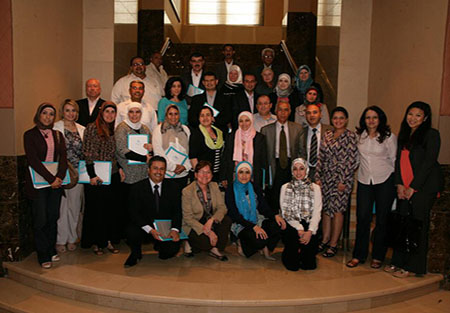The Health Policy Project ended in 2016. Work continued under Health Policy Plus (HP+) until 2022.
NEWS & VIEWS
Posted August 7, 2013
 |
| Key political and national stakeholders attend a communications and advocacy workshop held by the Health Policy Project's Jordan field staff (HPP) in conjunction with the Higher Population Council (HPC) in June, 2013. |
Jordan has one of the fastest growing populations in the world. For the past 20 years, the government and local health organizations have aimed to provide couples better access to family planning for birth spacing, and to reduce high fertility and growth rates that, unchecked, may negatively affect development efforts. Despite efforts to increase access, there remains a large unmet need for contraception, and population growth rates remain high. If this trend persists, the number of people calling this small Middle Eastern country “home” will double in less than 30 years, straining resources available to Jordanians for education, health, and environmental resources such as energy and water.
The makings of a national strategy
Approximately 60 percent of Jordan’s rapidly expanding current population is under the age of 25. This cohort of young adults presents opportunities for national economic growth, but will face a more challenging future than their parents if population growth results in competition for scarce resources.
The Higher Population Council (HPC) has been working to address family planning, population, and development issues in Jordan since 2002. In 2012 under the guidance of Princess Basma Bint Talal, the HPC set out to create a national family planning and reproductive health (FP/RH) strategy that would help government leaders understand the link between managing population growth and economic development, appreciate the health benefits of expanding family planning services to couples, and invest the required resources to ensure access to services for Jordanians of reproductive age.
As a first step in developing this new FP/RH strategy, in 2010 the HPC received assistance from the USAID-funded Health Policy Project (HPP) to conduct research gauging the availability of reproductive health services and supplies, equity of access, and general attitudes toward family planning in Jordan.
Using these research findings, experts from HPC developed a plan to increase support for the development of a new national RH/FP strategy. As part of this effort, HPC presented their results on the FP/RH climate in Jordan to key stakeholders. They also presented syntheses of data utilizing HPP’s RAPID software model, which projects the social and economic impacts of rapid population growth on labor, education, and health. Each presentation was met with the same pledge from policymakers: more support must be provided to prioritize reproductive health and population issues in Jordan.
With key stakeholders and policymakers pledging to support family planning and reproductive health efforts in Jordan, the HPC then led a group of local and international partners to craft the five-year FP/RH strategy. The strategy identifies the resources required to support robust family planning and reproductive health programs, and specific target areas to maximize the impact of these interventions. It also includes advocacy initiatives to educate citizens in the benefits and uses of modern family planning methods.
In May 2013, the HPC approved the final FP/RH strategy, which seeks to contribute to economic growth and the broader National Agenda of improving the welfare of the people of Jordan.
“I commend the efforts of local and international partners that have supported the Higher Population Council’s work, particularly the Health Policy Project, for the technical support in developing this document,” said former HPC Secretary General Professor Dr. Raeda Al Qutob.
Though there is much work to be done to achieve the goals laid out in the FP/RH strategy, the process of developing it has provided evidence that key stakeholders and policymakers recognize the importance of slowing population growth for maternal and infant health, economic development, and the preservation of precious natural resources. With this new strategy in place, the HPC has created a roadmap for future national efforts to promote family planning and ensure access to reproductive health services in Jordan.
What's New
- Something to Build On: “Innovation Exchange” Celebrates the Health Policy Project’s Close and a New Beginning
- What Will it Take for Tanzania to Achieve ART Targets and Ensure Long-Term Sustainability of the HIV Response?
- Helping Kenya’s County Leaders Advocate for Increased Health Investments
- HPP Holds Working Meeting on Ensuring Responsible PEPFAR Transitions for Key Populations
- Health Policy Project Celebrates 2016 International Women's Day
- HPP Staff Participate in White House Conference on HIV Stigma Reduction

